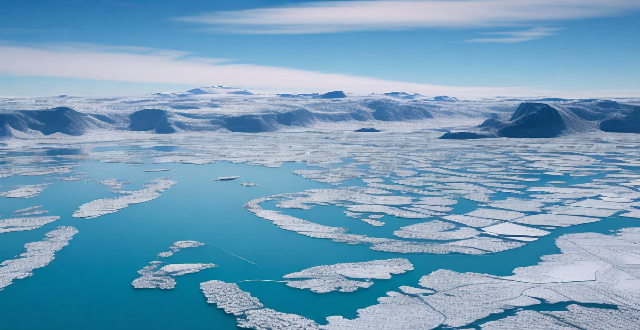Global warming is causing significant impacts on polar ice caps and glaciers, including the melting of Arctic sea ice, shrinkage of ice sheets in Greenland and Antarctica, retreat of mountain glaciers worldwide, rising sea levels, ecological changes, climate system feedback loops, and economic and social impacts. Mitigation and adaptation efforts are essential to address these challenges.

Global Warming's Impact on Polar Ice Caps and Glaciers
Global warming, caused by the increase in greenhouse gases like carbon dioxide in Earth's atmosphere, is leading to a rise in average surface temperatures. This phenomenon has profound effects on polar ice caps and glaciers worldwide. Here are some key points detailing these impacts:
Melting of Arctic Sea Ice
- The Arctic is experiencing unprecedented rates of sea ice loss during summer months.
- Satellite data shows a decline in the extent and thickness of the Arctic sea ice since the late 20th century.
- This melting contributes to rising sea levels globally.
Shrinkage of Ice Sheets
- Greenland's ice sheet is losing mass at an accelerating pace due to increased melting and calving of ice into the ocean.
- Similarly, the Antarctic ice sheet is also experiencing melting, particularly in the West Antarctic region.
Retreat of Glaciers
- Glaciers around the world are retreating at alarming rates due to warmer temperatures.
- This retreat is particularly visible in mountain ranges such as the Alps, Himalayas, Andes, and Rockies.
- As glaciers shrink, they contribute to sea level rise and affect local water supplies.
Rising Sea Levels
- The melting of polar ice caps and glaciers contributes significantly to global sea level rise.
- Low-lying coastal areas and island nations are at risk of flooding and even becoming uninhabitable.
Ecological Changes
- The loss of sea ice alters habitats for marine mammals like polar bears and seals.
- Changes in freshwater systems affect fish populations and other aquatic species.
Climate System Feedback Loops
- Melting ice reduces the albedo effect (the reflection of sunlight), causing more heat absorption and further warming.
- Warmer oceans can disrupt ocean currents, affecting global weather patterns.
Economic and Social Impacts
- Communities reliant on fishing or tourism in cold regions face economic challenges.
- Indigenous peoples whose cultures are tied to the ice are particularly affected.
Mitigation and Adaptation
- Reducing greenhouse gas emissions globally can slow down the rate of ice loss.
- Adaptation strategies are being developed to cope with the changing conditions.
In conclusion, global warming is having a profound impact on polar ice caps and glaciers, with wide-ranging consequences for ecosystems, climate patterns, and human societies. Urgent action is needed to mitigate these effects and prepare for the changes that are already underway.